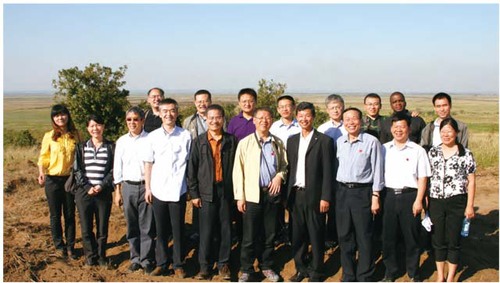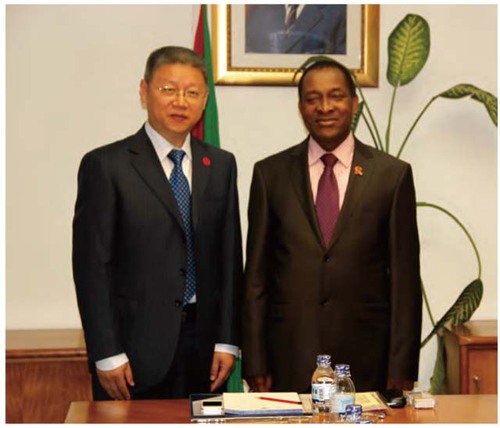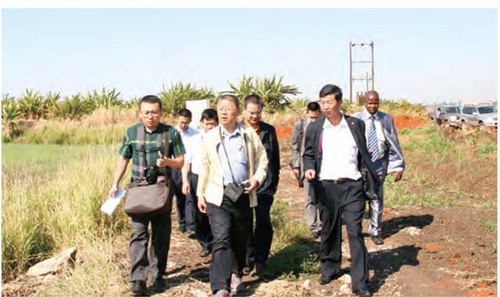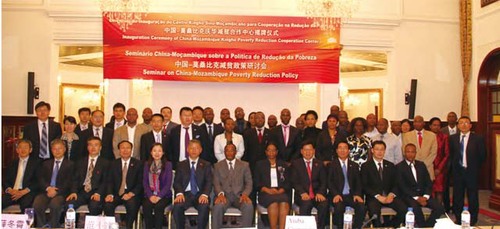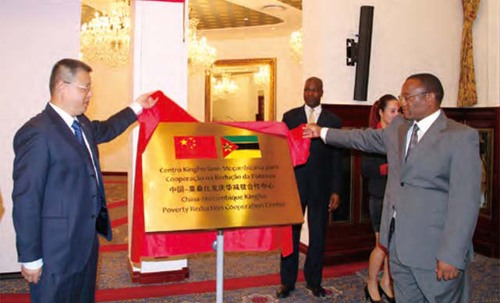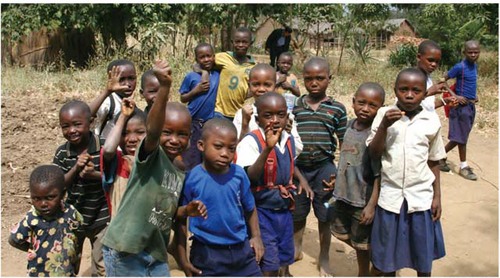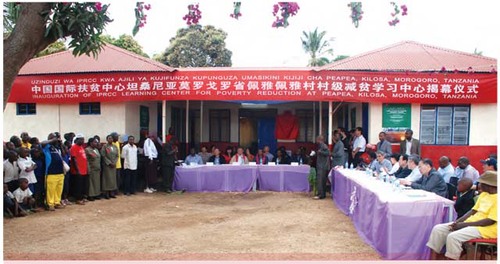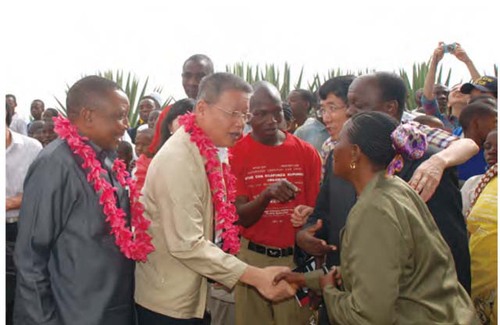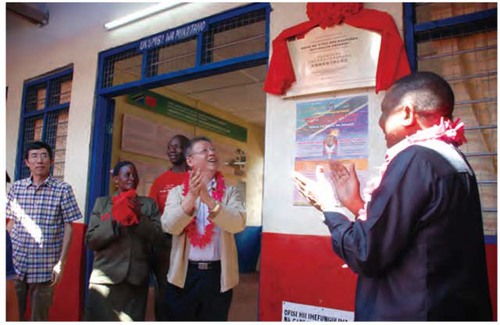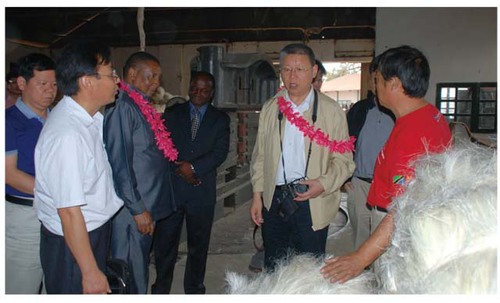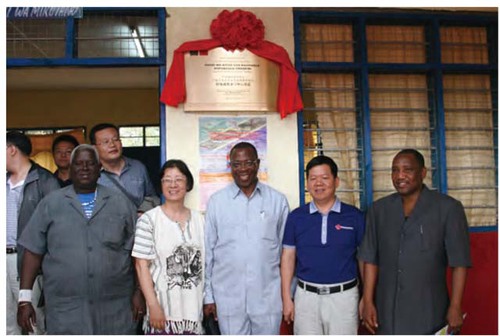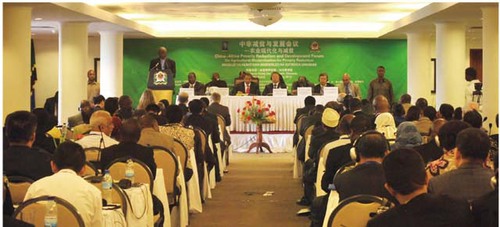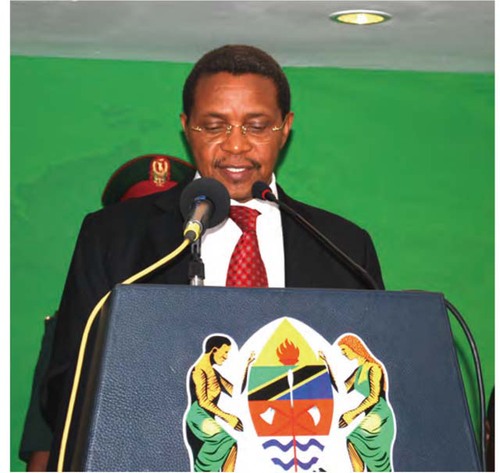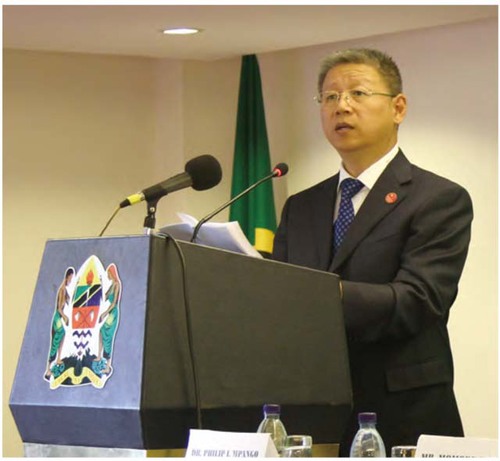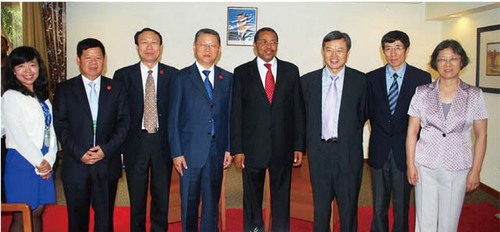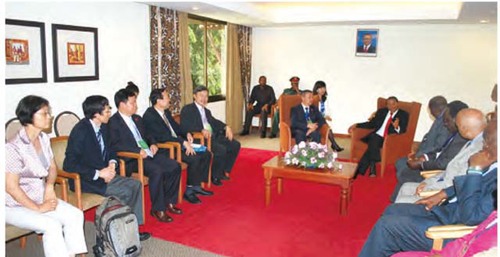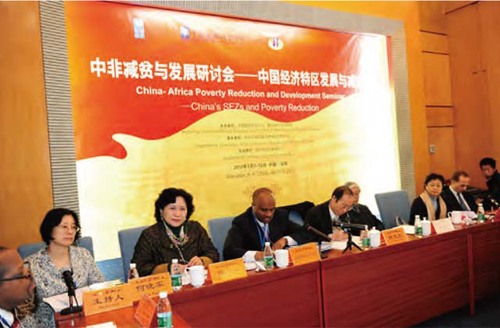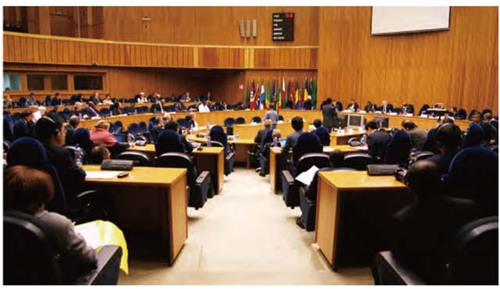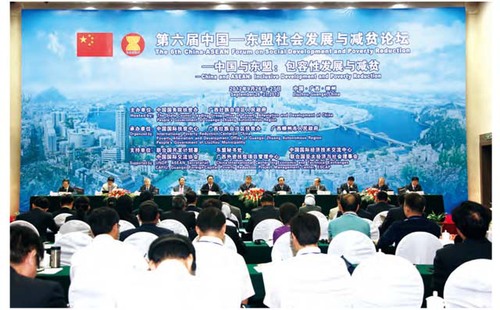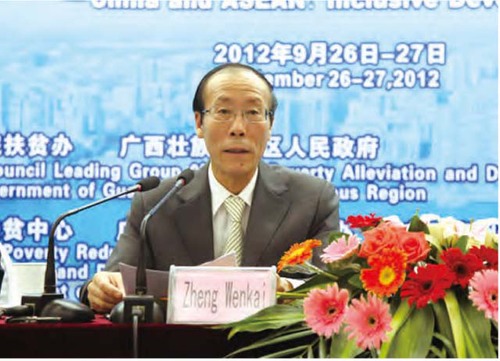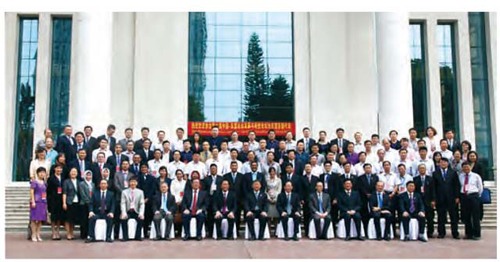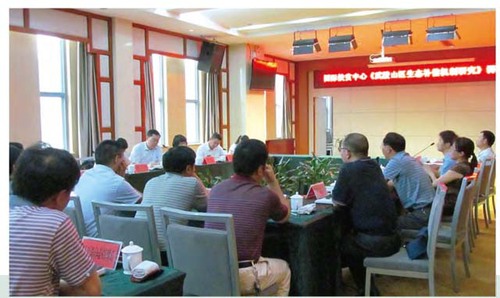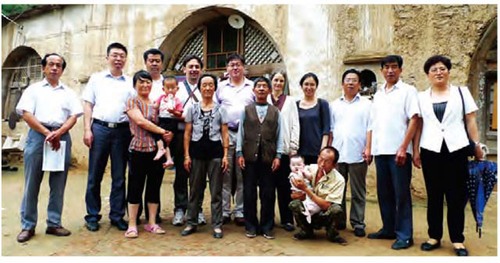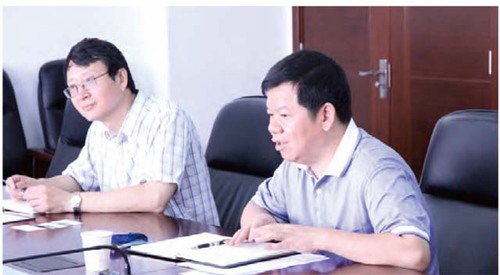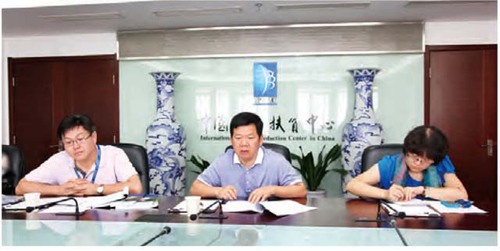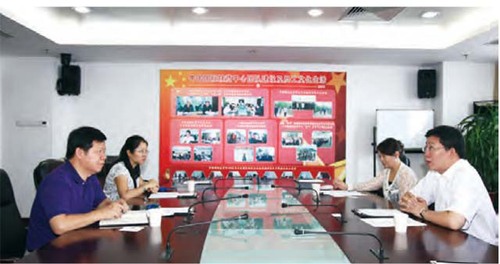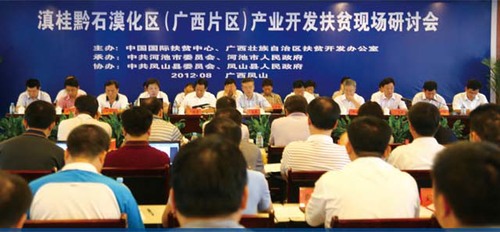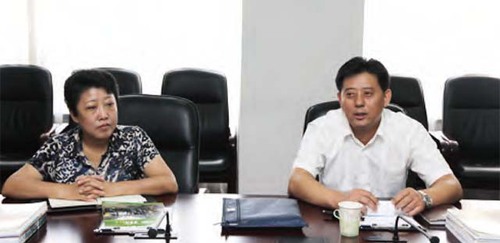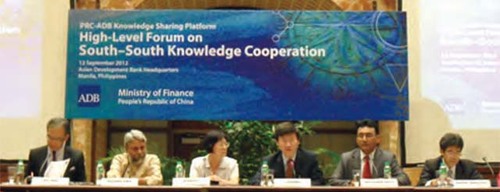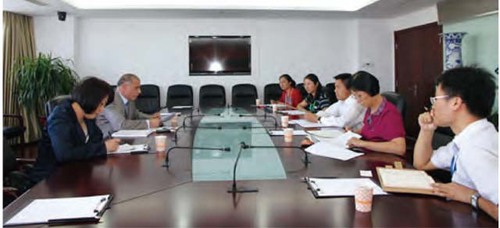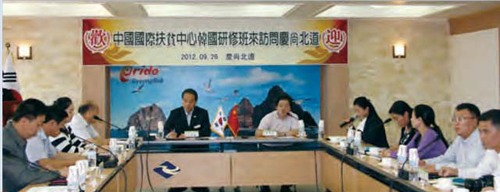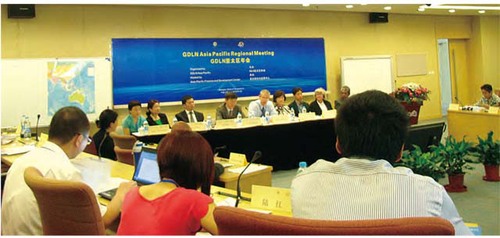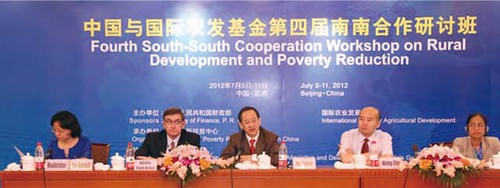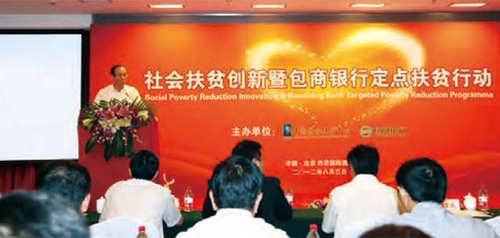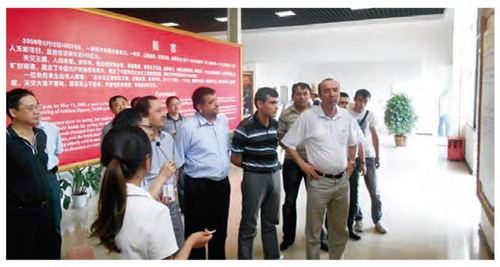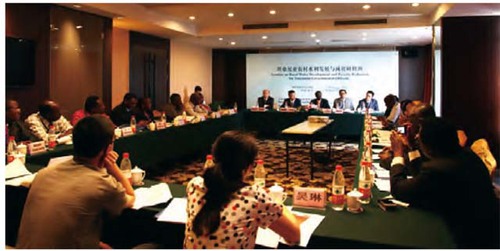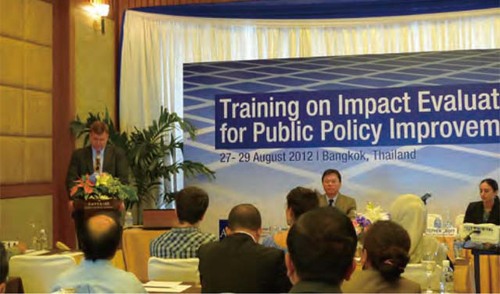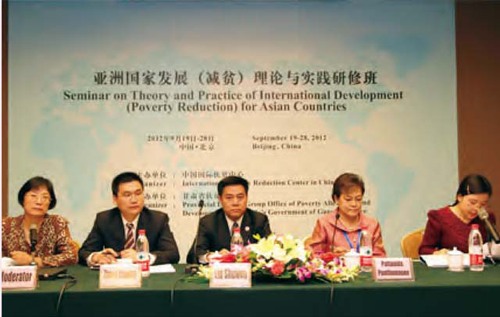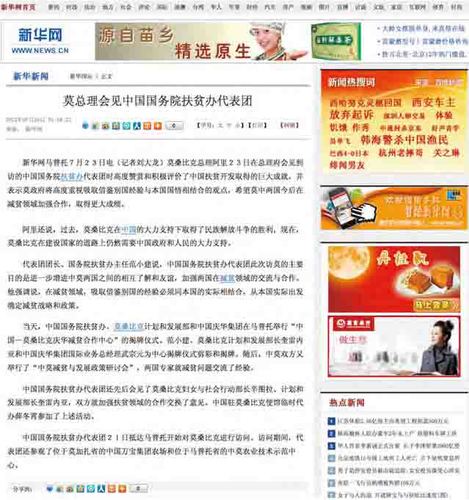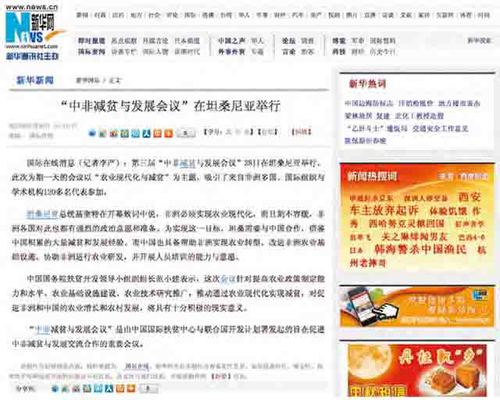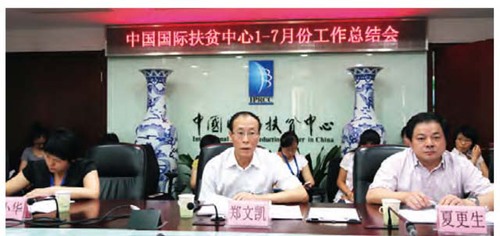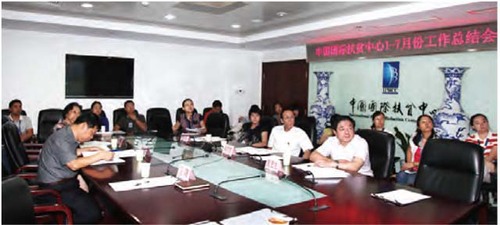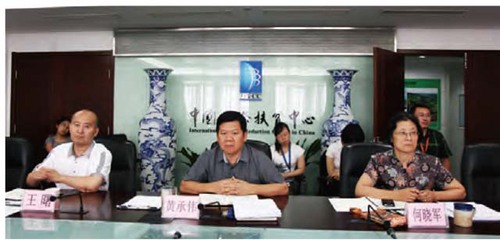The third quarter of 2012 quarterly
HIGHLIGHTS
LGOP Minister‘s Visit toMozambique
21-25 July, 2012 --- A LGOP delegation led by Fan Xiaojian, LGOP Minister and Deputy Head of the State Council Leading Group of Poverty Alleviation and Development, paid an official visit to the Republic of Mozambique. The delegation was composed of China’s State Council Leading Group Office of Poverty Alleviation and Development, International Poverty Reduction Center in China, China’s State Council Research Office, National Development and Reform Commission, Ministry of Commerce and Ministry of Foreign Affairs.
During his visit, Fan met with Mozambican Prime Minister Aires Ali, and other high level officials including Minister of Development and Planning Mr. Aiuba Cuereneia and Minister of Women and Social Action Iolanda Cintura. He also attended the Inauguration Ceremony of “China-Mozambique-Kingho Poverty Reduction Cooperation Center” and the “Seminar on China-Mozambique Poverty Reduction Policy”. Prime Minister Ali extended a warm welcome to Minister Fan and his delegation members. The former believed that frequent high-level mutual visits between China and Mozambique for a long time fully have reflected the importance attached by both governments to their friendly relations, and pointed out that poverty reduction is also at the heart of the administration of the Mozambican government. The exchanges and cooperation between China and Mozambique in the area of poverty reduction will definitely improve the planning and organizing capabilities of the Mozambican government, increase the efficiency of national policy and strategic planning for poverty reduction, and deepen the friendly partnership between the two sides. According to Fan, since the establishment of diplomatic ties and thanks to the great attention paid by both governments, China and Mozambique have constantly deepened their diplomatic, political and economic exchanges and cooperation. In particular, their cooperation on poverty reduction has made some new progress. The setup of “China-Mozambique Kingho Poverty Reduction Cooperation Center” indicates that the exchanges and cooperation between the two countries will embrace a new stage, and a new mechanism involving enterprises based on government cooperation will be launched. Fan added that, the center will perform tasks in four primary aspects: policy consulting, capacity building, cooperative study and community demonstration. On July 23, the Inauguration Ceremony of China-Mozambique Kingho Poverty Reduction Cooperation Center was grandly held at the Polana Hotel in Maputo, the capital of Mozambique. Approximately 80 people attended the inauguration ceremony, including a delegation led by Fan Xiaojian, LGOP Minister and Deputy Head of the State Council Leading Group of Poverty Alleviation and Development, representatives of China Kingho Group, as well as officials from Mozambique’s Ministry of Planning and Development, Ministry of Science and Technology, Ministry of Health, Ministry of Agriculture, and Mozambican First Lady’s Office. The inauguration ceremony marked the official start of the exchanges and cooperation in the field of poverty reduction between the two countries. Just like what head of the Chinese delegation and LGOP Minister Fan Xiaojian pointed out, “As a big event of milestone significance, the founding of China-Mozambique Kingho Poverty Reduction Cooperation Center” symbolizes the official setup of the platform for China-Mozambique exchanges and cooperation on poverty reduction”. The Seminar on China-Mozambique Poverty Reduction Policy, co-sponsored by IPRCC and the Ministry of Planning and Development of Mozambique and supported by China Kingho Group, was held at the Polana Hotel in Maputo. The seminar was chaired by IPRCC Deputy Director General Huang Chengwei. LGOP Minister Fan Xiaojian delivered a keynote speech at the opening ceremony, and Mozambique’s Minister of Development and Planning Mr. Aiuba Cuereneia attended the opening ceremony. Experts from China and Mozambique introduced their respective national policies on poverty reduction and rural development, and relevant issues were discussed by representatives. This seminar marked the first activity after the establishment of the “China-Mozambique Kingho Poverty Reduction Cooperation Center”. The meeting held that both China and Mozambique were still faced with severe challenges on the road to development and revitalization. The Chinese government is willing to share its experience with the government and people of Mozambique and to work with its counterpart to address challenges and seek common development. The success of the seminar provided an opportunity and platform for advancing the exchanges and cooperation on poverty reduction between the two countries.On the morning of July 24, LGOP Minister Fan led the delegation to visit the China-Mozambique Kingho Poverty Reduction Cooperation Center and took photos with the staff of China Kingho Group’s Mozambique Branch.
LGOP Minister Fan Xiaojian at the Inauguration Ceremony of “China-Tanzania Village-level Learning Center for Poverty Reduction”
26 July, 2012 --- An LGOP delegation headed by Minister Fan Xiaojian visited the community development demonstration study program in Peapea Village, Ludaiwa, Kilosa Morogoro of Tanzania and attended the inauguration ceremony of “China-Tanzania Village-level Learning Center for Poverty Reduction”. The center is 360 kilometers away from its capital, Dar es Salaam. Lv Youqing, China’s ambassador to Tanzania, Philip Mpango, Executive Secretary of the Tanzanian President’s Office Planning Committee and Joel Bendera, Commissioner of Morogoro District also accompanied the delegation and attended the ceremony.
As one of the important activities conducted by IPRCC for promoting China-Tanzania poverty reduction exchange and cooperation, Peapea Village Learning Center for Poverty Reduction is the first village-level demonstration program established in Africa, with a range of objectives including strengthening village-level organizations and the study and management abilities of villagers in order to solve the prominent issues in agricultural production, as well as increasing agricultural productivity and farmers’ income to reduce poverty by conducting small-scale and various demonstration activities. China Agricultural University and Tanzanian Branch of China-Africa Agricultural Investment Co., Ltd. will provide technical support for the program. The demonstration program includes capacity building, technical training, agricultural demonstration, small-scale processing and mini irrigation as well as village infrastructure construction. The program was launched in April, 2011. Until now, a learning center and public drinking water and healthcare facilities have been set up, village roads have been refurbished, and corn planting demonstration as well as multiple agricultural technology, micro-finance and women development trainings have been conducted. Minister Fan Xiaojian and Joel Bendera jointly cut the ribbon for the inauguration ceremony of the learning center. Both Joel Bendera and Philip Mpango addressed the ceremony and expressed his gratitude to IPRCC for supporting the local community. They also hoped to make subsequent arrangements for the follow-up activities to make it become a model for rural development and a testament to China’s friendship with Tanzania. Ambassador Lv extended his congratulations on the establishment of the center and commended its poverty reduction model based on capacity building. Fan said, “The inauguration of the China-Tanzania Village-level Learning Center for Poverty Reduction is a milestone for the China-Tanzania exchange and cooperation in the field of poverty reduction. We sincerely hope that with the joint efforts of all parties, the co-pilot program will achieve a full success and the center will fully play of its role as a bridge in promoting mutual development and bilateral friendship between China and Tanzania.”The delegation visited the newly completed learning center and learned how the demonstration households implemented the program. The center will serve as the village government office and will be installed with public drinking water facilities. The delegation also visited a sisal farm, its affiliated hospital and staff club owned by Tanzanian Branch of China-Africa Agricultural Investment Co., Ltd. Director Fan Xiaojian made an inscription or the sisal farm, “You have been working so hard for the friendship between China and Tanzania!”
The 3rd China-Africa Poverty Reduction and Development Conference Takes Place in t Dar-es-Salaam
July 28, 2012 --- The China-Africa Poverty Reduction and Development Conference was opened in Dar-es-Salaam, the capital of Tanzania. Jakaya Kikwete, President of the United Republic of Tanzania, and Fan Xiaojian, Deputy Head of the State Council’s Leading Group of Poverty Alleviation and Development and Director of the Leading Group Office of Poverty Alleviation and Development attended and addressed the opening ceremony. Government officials and scholars from China and Africa, together with more than 120 representatives from UNDP, the World Bank, DFID, etc. were present at the meeting, including more than 20 ministerial-level delegates from Tanzania, Ghana, Kenya, Eritrea, Mauritius, Uganda, Sierra Leone and Mauritania, rural economy and agriculture commissioners of the African Union, as well as senior representatives with Southeast African organizations.
Themed on “Agricultural Modernization for Poverty Reduction”, the one-day meeting was co-hosted by IPRCC and the Tanzania President’s Office Planning Commission, with the objective of sharing the experience of China and Africa in agricultural development, and finding approaches to promote poverty reduction through agricultural modernization and development cooperation. The meeting discussed the formulation of agricultural polices of China and agricultural development policies of Africa, with a particular reference on “The Role of Agricultural Infrastructure Construction and Agricultural Technology Research and Extension in Promoting Agricultural Modernization”, and “The Role of Agricultural Industrial Chain and Farmers’ Organization in Promoting Agricultural Modernization”. “Holding this meeting soon after the conclusion of the fifth Sino-Africa ministerial forum is very opportune indeed, it presents a unique opportunity to follow up of some of the decisions made in that conference. It also underlines excellent relations between china and Africa," said Tanzanian President Jakaya Kikwete while opening the forum. About 70 percent of the people of sub-Sahara Africa live in rural areas and depend on agriculture for their livelihood and because of African agriculture being traditional in character, there is very little use of modern science and technology both productivity and production are very low, he said. To avert the unfavorable situations, the low productivity and production in agriculture must be addressed and solved, he said. "African agriculture must be modernized in order to make people of our dear continent wealthier and healthier," said the president, noting that "the time is now and we have the readiness and willingness to do it".He added that since its independence, Tanzanian has made great efforts in agricultural reform. In 2006, it began to implement agricultural development projects. In 2009, the government embarked on a vigorous effort to strengthen its cooperation with private sectors to cope with fund shortage and achieve food sufficiency and even exports. Under the guidance of “agriculture is the first industry”, Tanzania has not only constantly transformed agriculture, but also turned to be one of the global major food suppliers oriented to its neighbors and the rest of the world. “I am convinced that we can succeed.”
He noted that Tanzania needs to cooperate with China, since China has accumulated a great deal of experience in poverty reduction and development and is competent in facilitating Africa’s agricultural transformation, improving its infrastructure, and conducting agricultural R&D and training of related personnel. China’s private sectors can also establish manufacturing enterprises with Tanzania. With a population of 1.3 billion, China is an important market for African’s agricultural products, so Tanzania hopes to access the Chinese market via this event.
In his opening remarks, Mr. Fan indicated that the 5th Ministerial Meeting of China-Africa Cooperation Forum just concluded in Beijing on July 20. It discussed approaches to deepen the new strategic partnership between China and Africa; defined the key areas and important measures in cooperation between the two sides within the next three years, developed relevant action plans as well as announced the new initiatives to be taken by the Chinese government in order to step up cooperation with Africa. This event, following up the 5th Ministerial Meeting of China-Africa Cooperation Forum, was of greater significance.
Fan pointed out that, China and African countries remain in the same development stage, share common goals in promoting development and eliminating poverty. For a long time, China and African countries have been actively exploring development approaches in seeking national prosperity and pursuing happiness, with remarkable achievements in stimulating growth, accelerating poverty reduction and pushing forward social progress. China is the first country having achieved the goal set by the MDGs of lifting half of its poor population out of poverty. Meanwhile, we are pleased to see that since 2005, sub-Saharan Africa has witnessed a decline in the proportion of the poor population, and poverty incidence.
As Fan emphasized, agricultural and rural development constitutes an important basis for growth and poverty reduction. With a view to improving the capacity and level of agricultural policy-making, agricultural infrastructure construction and agricultural technology research and extension, and realizing poverty reduction through agricultural modernization, this event will be of particularly significance in advancing agricultural growth and rural development of both Africa and China.
The China-Africa Poverty Reduction and Development Conference was a critical event initiated by IPRCC and UNDP for promoting the exchange and cooperation between the two sides. The first session, co-hosted by IPRCC, UNDP and the Ethiopian government, was held in Addia Ababa, Ethiopia’s capital, while the second in China’s Shenzhen. Until now, it has become an crucial platform for sharing development experience between China and Africa.
The 6th China-ASEAN Forum on Social Development and Poverty Reduction held in Liuzhou
The 6th China-ASEAN Forum on Social Development and Poverty Reduction took place in Liuzhou, Guangxi. This event was hosted by LGOP and the People’s Government of Guangxi Zhuang Autonomous Region, organized by IPRCC, the Poverty Alleviation Office of Guangxi Zhuang Autonomous Region, and Guangxi Liuzhou Municipal People’s Government, and supported by ASEAN Secretariat, UNDP, Chinese Association for International Understanding (CAFIU), China International Center for Economic and Technical Exchanges (CICETE), ADB, ESCAP, and Guangxi International Expo Affairs Bureau. Over 100 people attended the forum, including government officials, experts, scholars, and media staff from China and ASEAN countries, representatives of China-invested enterprises, NGOs and international organizations. Themed on “China and ASEAN: Inclusive Development and Poverty Reduction”, this forum advocates the elimination of social exclusion and institutional barriers, and the creation of a more favorable development environment for the poor by promoting equal development opportunities and regional trade; moreover, it suggests sharing the fruits of economic growth and development with more poor people through better income distribution.
Fan Xiaojian, LGOP Minister and Deputy Head of the State Council Leading Group of Poverty Alleviation and Development, Wei Chaoan, Deputy Secretary of the Party Committee of Guangxi Zhuang Autonomous Region, Chen Zhangliang, Vice President of the People’s Government of Guangxi Zhuang Autonomous Region, Zheng Wenkai, Deputy Director of LGOP, Li Chunguang, Director of the Department of International Cooperation and Social Mobilization of LGOP, Chen Gang, Secretary of Liuzhou Municipal Party Committee, Zheng Junkang, Mayor of Liuzhou Municipal People’s Government, Nguyen Minh Tien, special representative of the ASEAN Senior Officials Meeting on Rural Development and Poverty Eradication, Ye Xingqing, Director General of the Rural Economy Research Department of the State Council Research Office, Christophe Bahuet, UNDP China Country Director, Wu Yuxiong, Director of the Poverty Alleviation Office of Guangxi Zhuang Autonomous Region, and Jiang Jiabo, Deputy Secretary General of the People’s Government of Guangxi Zhuang Autonomous Region were present at the opening ceremony.
Minister Fan Xiaojian pointed out in his speech that, in order to further promote inclusive development and poverty reduction, the Chinese government promulgated the Outline for Poverty Reduction and Development of China's Rural Areas (2011-2012) in 2011. It puts forward several overall objectives: by 2020, poverty reduction targets shall have adequate food and clothing, and have access to compulsory education, basic medical treatment and housing; the increase of per capita net income of farmers in poverty-stricken areas shall be higher than the national average, the indicators of key areas of basic public services shall approach the country’s average level, and the widening development gap shall be reversed. The Chinese government will take the protection and improvement of people’s livelihood as a main target of poverty reduction and development in the new stage, improve the institutional arrangement effectively combining development-oriented poverty reduction and rural social security, with focus on contiguous extremely poor regions. A grand poverty alleviation pattern integrating special poverty reduction, industry-based poverty reduction and social poverty reduction shall be consolidated and advanced to facilitate the balanced development of economy, society, resources and environment of impoverished areas. The Chinese side is willing to share its experience in poverty reduction and development with ASEAN countries.
Field Research
IPRCC Working Goup Conducts Field Research in Wuling Mountain Area
From July 1st to 8th ----A research group of IPRCC carried out research of poverty-stricken area in the region of Wuling Mountain, which consists of 4 special topics and aims at Jianshi County, Enshi Tujia and Miao Autonomous Prefecture.
1-6 July, 2012 --- A working group of IPRCC, by taking Wuling Mountain Area as an Example for “the Study of the Eco-Compensation Mechanism of Poverty-stricken Areas”, went on a field research in Jianshi county, Enshi Tujia and Miao autonomous prefecture in Hubei province. The research group was composed of relevant experts from IPRCC’s Research Division and the Institute of Finance & Economics Research of Shanghai University of Finance and Economics. The research is one of the four special studies concerning the issues of poverty reduction and development in the Wuling Mountain area carried out by IPRCC.
As one of the series of studies on poverty alleviation and sustainable development of contiguous areas with extreme financial difficulties in Wuling Mountain area, the objective of which is to identify initiatives in balancing development-oriented poverty reduction and eco-environmental protection, understanding relations between poverty and eco-system, and working out the action in need to be taken concerning eco-environment, natural source and poverty. In addition, this study attempts to adopt theories on eco-compensation and sustainable development measures, put forward the eco-compensation mechanism and policy suggestions suitable for local development and avoid trapping in a dilemma that makes improvement after destruction.
From July 2nd to 8th----The second topic: A research group, composed of relevant personnel from IPRCC and Social Science College of Central China Normal University, went to Jianshi to carried out 7-day research activity of “Relevant Problem Research on Regional Development and Poverty Alleviation in Region of Wuling Mountain”. Taking the example of Jianshi County, the research analyzed and summarized the theory of regional development and poverty alleviation in the region of Wuling Mountain by field visit and document analysis, discussed the workable mode of regional development and poverty alleviation, and well arranged the relationship between regional development and poverty alleviation. Through the research, policy basis will be provided for the regional development and poverty alleviation in the region of Wuling Mountain, and the concrete policy and measure will be provided to implement the new 10-year development outline of poverty alleviation in the region of Wuling Mountain.
The research group carried out in-depth interview with the relevant personnel of Poverty Alleviation Office, Bureau of Nationality and Religion, Bureau of Development and Reform of Jianshi County, and visited and investigated poverty families in Hongyansi Town, Sanli Town, Changliang Town and so on, to learn the reason of poverty, and discuss the important measures to promote synergetic development of economy, society, culture and ecology in the region of ethnic minorities and the region with vulnerable ecology.July 3rd ---Third topic: General coordinator of IPRCC, Dr. Cheng Enjiang and professor Ma Jiujie of College of Agriculture and Rural Development of Renmin University of China led the research group to go to Jianshi County, Hubei Province to carry out research, aiming at the issue of “Financial Reform Innovation and Poverty Alleviation Development of County Region”.
During the research, the research group respectively carried out discussions with the relevant local government departments, main financial institutions, agriculture-related enterprises and specialized cooperative organizations of farmer, and carried out field research for parts of enterprises, specialized cooperative organizations of farmer and farmer household, and deeply learned the supply and demand status of rural finance in Jianshi County, and collected basic information for the policy of financial poverty alleviation development in poverty region.
5 July ---In order to implement the speech spirit of Premier Wen Jiabao in the crucial work symposium of poverty alleviation in Wuling Mountian, and know the problems of county-level implementation planning formulation since the poverty alleviation planning in Wuling Mountain was launched, and guide to carry out several topic researches at the same time. Deputy Head of the IPRCC, Huang Chengwei listened to the report by the research group of ecological compensation mechanism, and put forward requirements for the research goal and next research work, and then led the expert group to go to Enshi, Hubei Province, to carry out the last topic research.
The research aims to carry out summary and analysis for the regional development and implementing planning of poverty alleviation in Jianshi County, and poverty alleviation development in new stage and other methods by carrying out group discussions with relevant departments of Enshi and Jianshi. The research also gives references and suggestions for the planning formulation of regional development and poverty alleviation in county-level regions. The members of the group come from GIZ, Beijing Normal University, Minzu University of China, Central China Normal University, Land Resources Development and Regional Economy Research Institute of National Development and Reform Commission and other institutions.
IPRCC Researchers and Oxford Experts Investigate Lvliang Mountain
From July 8th to 10th----In order to well carry out the implementation of national science and technology supporting plan---Key Technologies and Applications of Spatial Information System of Poverty Alleviation. The researcher of IPRCC and professor Sabina Algiers, a famous expert of global multi-dimension poverty measuring of Oxford University went to a poverty county--- Liulin County, Shanxi Province, to carry out investigation. Division chief of Poverty Alleviation Office of Shanxi Province, Zhang Jiancheng accompanied the investigation. The investigation group and Poverty Alleviation Office of Liulin County discussed the development gap, poverty situation and poverty alleviation measure of areas with rich coal resource, and emphasized to introduce 8 projects of poverty alleviation with whole-village scale which were implemented in 2011, The international expert thought highly of the poverty alleviation with whole-village scale, and the comprehensive promotion by combining development of leading industry, infrastructure construction, social development and environmental remediation. When the poverty alleviation projects are carried out with whole-village scale, farmers are active to participate, and demand investigation is carried out for poverty families, and “Preferentially support poverty family, Transparent, Fair and Democratic” serves as basic working rules. Especially when learning the measures mentioned above, the international expert spoke highly of that.
The investigation group personally went to the village clinic, cave dwellings in which poverty families live, and ecological agricultural park participated by leading enterprises in Xiachakou Village, Liulin County, and carried out thorough investigation. After the investigation, the group carried out preliminary discussion, which aims at that Poverty and Human Development Center of Oxford University supports IPRCC to implement supporting plan of science and technology, “Environment and ecological dimension” is brought into the present multi-dimension poverty measuring, and “Education, Health and Living Standard” of multi-dimension poverty measuring is expanded from 3 dimensions to 4 dimension. Environmental and ecological index of poverty region is brought into multi-dimension measuring by GIS data, which is an active useful trial just after “Green Economy under Background of Sustainable Development and Poverty Alleviation” of UN Conference of Sustainable Development, therefore, the group presented a positive appraise.
Information Publicity
IPRCC Deputy DG Huang Chengwei Meets with DFID Chief Economist
17 July, 2012 --- IPRCC Deputy Director General Huang Chengwei met with DFID Chief Economist Stefan Dercon. Huang briefed the visitors on the organizational structure and major activities of IPRCC. The two sides also exchanged opinions on IPRCC’s research network building, China’s experience in agricultural development and its implications to Africa, as well as experience learning and sharing under the context of South-South cooperation. Both sides believe that it is necessary to utilize their own advantages to strengthen inter-institutional information exchange and share research findings. Shantanu Mitra, Senior Economic Advisor of DFID China, Dr. Cheng Enjiang, Chief Research Coordinator of IPRCC, and the relevant staff from IPRCC’s Research Division also participated in the meeting.
IPRCC Deputy DG Huang Chengwei Meets with Experts from World Bank’s Independent Evaluation Group
On July 17, 2012, Deputy Director General Huang Chengwei of International Poverty Reduction Center in China (IPRCC) met with experts of the World Bank’s Independent Evaluation Group (IEG), Mr. Hjalte Sederlof and Ms. Sun Xiaolun. The aim of this evaluation is to assess the knowledge cooperation projects launched and completed by China from 2006 to 2011 and summarize the lessons and experience in the implementation of projects. The final assessment report will be submitted to the World Bank’s board of directors, executives and China’s Ministry of Finance.
After his brief introduction to a series of activities on training, research, exchange, cooperation and information sharing conducted by IPRCC under the context of South-South Cooperation, Mr. Huang Chengwei comprehensively commented on the poverty reduction projects jointly implemented by the World Bank and China. Then he made comments on the “From Poor Areas to Poor People: Evolution of China’s Poverty Reduction Agenda” which was an assessment report organized by the World Bank on the poverty and inequality in China, as well as the three sessions of the “High Level Symposium on China-Africa Experience Sharing” co-hosted by the World Bank and IPRCC. Mr. Huang suggested that the World Bank should give full play to its role as a knowledge bank, strengthen its cooperation with Chinese government in terms of information sharing and policy design, and optimize the network for coordination. In response to the rapidly developing socioeconomic environment in China, the World Bank should bring forward timely recommendations on the development and poverty reduction suitable for China’s actual conditions, increase its support to the capacity building of IPRCC’s South-South knowledge sharing platform, and promote the accumulation and sharing of China’s development experience. Director Wang Xiaolin of the Research Division of IPRCC introduced the World Bank’s important participating role in the “China-DAC Study Group” and affirmed its intellectual support and contributions. He also puts expectations on the World Bank in enhancing cooperation with China and helping the world out of economic recession.
IPRCC Deputy DG Meets with Deputy SG of Chinese Association for International Understanding
On August 13, 2012, Deputy Director Huang Chengwei of International Poverty Reduction Center in China (IPRCC) met with Deputy Secretary-General Liu Kaiyang of Chinese Association for International Understanding which is a member of council of IPRCC. Both sides exchanged on exploring collaborative areas and strengthening mutual partnership.
Mr. Huang Chengwei briefly introduced the background and purpose for the establishment of IPRCC as well as its five categories of operational activities. Then Mr. Liu Kaiyang gave an introduction to the Association’s major activities in 1H12 and the working schedule for 2H12. With the re-positioning of the functions, Mr. Liu said, the Association will explore and enrich the theory and practice of people-to-people diplomacy from more angles and levels. As an issue with great concerns from the international community especially developing countries, poverty reduction has been becoming an important area of concern for the Association. Mr. Liu hoped that Chinese Association for International Understanding would strengthen its regular communication with IPRCC, and establish a normalized partnership.
Mr. Huang said that IPRCC can provide some support for the theoretical studies of people-to-people diplomacy, and proposed promoting mutual cooperation from four aspects. First, to enhance comprehensive exchange and understanding between the two sides. Second, to participate in or support the major activities organized by the other side. Third, to cooperate in promoting the richness of theories and the innovation in practice of all kinds of diplomacy such as political parties, public, people-to-people and poverty reduction. Fourth, to complement each other and jointly organize relevant activities.
Field Seminar on Industrial Development and Poverty Reduction in Stony Desertification Areas Held in Guangxi
On August 17, 2012, the Field Seminar on Industrial Development and Poverty Reduction in Stony Desertification Areas in Yunnan, Guangxi and Guizhou (Guangxi) was held in Fengshan County, Hechi City of Guangxi Zhuang Autonomous Region. The seminar was hosted by International Poverty Reduction Center in China (IPRCC) and Guangxi Poverty Reduction Office, organized by Hechi Municipal Committee and People’s Government, and co-organized by Fengshan County Committee and People’s Government. The meeting was presided over by Deputy Director Huang Chengwei of IPRCC. Leaders attending the meeting and making speeches were Director Li Chunguang of the International Cooperation and Social Poverty Reduction Department under the State Council Leading Group Office of Poverty Alleviation and Development, Director Wu Yuxiong of Guangxi Poverty Reduction Office, Huang Shiyong, Party Secretary and Director of the Standing Committee of Hechi, and Mayor He Xinxing of Hechi. A total of 200 participants present at the meeting included persons-in-charge of related departments of Guangxi Zhuang Autonomous Region and Hechi Municipal People’s Governments, as well as responsible heads and poverty reduction offices’ directors from Guangxi’s 29 counties and six planning counties.
The opening of the seminar aims to thoroughly implement the spirit of the working meeting by the Central Government on poverty reduction and development, determine new strategies for the sound interaction among socioeconomic development, poverty reduction and ecological construction in stony desertification areas, explore new ideas and measures for poverty reduction and development in Hechi, and thus provide theoretical basis and intellectual support for the implementation of “Plan on Regional Development and Poverty Reduction in Stony Desertification Areas in Yunnan, Guangxi and Guizhou”.
In February 2012, at the invitation of Hechi Municipal Committee and People’s Government, a research group of IPRCC went to Hechi to conduct research and completed the “Advisory Report on the New Stage of Poverty Reduction and Development Strategies for Hechi City”. The opening of this seminar is a follow-up specific action of the report. At the meeting, Dr. Wang Xiaolin, Director of IPRCC Research Division, delivered a special report on their research to all participants. In addition, the experts and scholars, who were invited to propose their comments and suggestions for the implementation of the planning in stony desertification areas in Yunnan, Guangxi and Guizhou as well as the promotion of poverty reduction and development in Hechi, were Director Ye Xingqing of Rural Area Division under the State Council Research Office, Deputy Director Zhao Changbao of Rural Economy Research Center under Ministry of Agriculture, Researcher Zhang Licheng of Research Institute for Fiscal Science under Ministry of Finance, and Prof. Wu Laping of China Agricultural University. The seminar also organized all participants to visit the Walnut planting and development in Longpeng Sub-village, Bolin Village, Zhongting Town, Fengshan County.
IPRCC Deputy DG He Xiaojun Meets with DFID Representatives
10 July, 2012 --- Ms. He Xiaojun, Deputy Director General of IPRCC met with Senior Economic Advisors of DFID Mr. Shantanu Mitra and Ms. Wu Lin. The two parties exchanged views on how IPRCC, the Ministry of Water Resources (MWR), and DFID could promote cooperation on Africa issues.
Ms. He Xiaojun expressed her willingness to work with MWR and DFID. The cooperation content can be identified through further negotiation, and the relevant responsibilities concerned can be specified by applying to a Memorandum of Cooperation. Later on, Ms. He introduced Mr. Mitra the demo projects of IPRCC in Tanzania, and the preparation of a training program for Tanzania officials to be co-organized with MWR and DFID. Ms. He also answered the questions related to funding, project construction and assessment mechanism for poverty reduction cooperation in Africa. Cooperation Division Chief of the IPRCC, Li Shaojun expects that DFID can support IPRCC’s activities in Africa such as capacity building, technical consulting, and small-scale infrastructure construction of demo projects. DFID expressed its willingness to join hands with IPRCC to conduct capacity building projects.
IPRCC Deputy DG He Xiaojun Meets with Deputy Director of the International Exchange Center of IDCPC
23 August, 2012 --- Ms. He Xiaojun, Deputy Director General of IPRCC met with Mr. An Yuejun, Deputy Director of the International Exchange Center under the International Department of the CPC Central Committee (IDCPC). The two sides exchanged views on strengthening business contacts and conducting cooperation in the field of poverty alleviation.
Mr. An briefly introduced the background, profile and major work of the International Exchange Center, and expected to work with IPRCC in the form of expert lectures, joint investigations, and thematic training on poverty reduction.
In response, Ms. He also gave an introduction about IPRCC’s institutional setting, major business and so forth. She explained that IPRCC has achieved numerous experience and competitive advantages in hosting international poverty reduction trainings and exchanges, and expressed her willingness to further strengthen ties between the two sides, facilitate a cooperative mechanism, give full play to their advantages to make a win-win achievement.
IPRCC Deputy DG He Xiaojun Attends the PRC-ADB Knowledge Sharing Platform: High-Level Forum on South-South Knowledge Cooperation
13 September, 2012 --- Ms. He Xiaojun, Deputy Director General of IPRCC, attended the PRC-ADB Knowledge Sharing Platform: High-Level Forum on South-South Knowledge Cooperation opened at the headquarters of ADB, and gave a speech titled “International Poverty Reduction Center in China - A Platform of South-South Knowledge Cooperation”.
China’s Assistant Minister of Finance Zheng Xiaosong and President of ADB Haruhiko Kuroda delivered a speech at the opening ceremony. Representatives from the Ministry of Commerce, Ministry of Foreign Affairs, IPRCC, and Asia-Pacific Finance and Development Center of China and delegates from Cambodia, Thailand, Vietnam, Myanmar, Bengal, and Japan International Cooperation Agency were present at the meeting.
Established in 2009, the PRC-ADB Knowledge-Sharing Platform is an important platform for China to make use of ADB’s resources superiority and conduct in-depth South-South knowledge cooperation with other developing countries in the Asia-Pacific. This forum was centered on such issues as the policy and development direction, experience and challenges of South-South knowledge cooperation, as well as the further improvement of its quality and efficiency.
Venezuelan Minister-Counsellor Visits IPRCC
17 September, 2012 --- Mr. Gonzalo Vivas Gonzalez, Venezuelan Minister-Counsellor to China visited IPRCC and discussed with the latter on the participation of the Venezuelan delegation in the upcoming 10.17 Poverty Reduction and Development Forum, and the execution of the Cooperation Work Plan 2012-2013 between LGOP and Venezuela’s Ministry of Commune and Social Protection.
This year, Venezuela plans to send a delegation headed by Vice Minister of Commune to the meting. The special visit paid by the staff of Venezuelan Embassy to IPRCC embodied the great importance attached by the Venezuelan side to the international exchanges and cooperation in poverty reduction. Liu Shuwen, Deputy Director of the International Cooperation and Social Mobilization Department of LGOP, IPRCC Deputy Director General He Xiaojun and related personnel from the Exchange and Cooperation Divisions joined the talks.
Seminar on “Capacity Building in Poverty Reduction” Opened in Seoul, South Korea
17 September, 2012 --- The Seminar on “Capacity Building in Poverty Reduction” took place at the Sangmyung University in Seoul, South Korea. This training activity was sponsored by IPRCC, organized by the Korea-China Cultural Association (KCCA) and Sangmyung University, and supported by the United Nations Development Programme (UNDP) and China International Center for Economic and Technical Exchanges (CICETE). 17 officials responsible for international poverty reduction training from IPRCC, CICETE and 8 provincial poverty alleviation offices and autonomous regions took part in this activity.
Mr. Yong Sung Park, Vice President of Sangmyung University addressed the opening ceremony, and Deputy Party Committee Secretary of LGOP Xia Gengsheng also delivered a speech on behalf of the sponsor and all trainees.
Lasting for 15 days, the training activity aims to promote experience exchanging and knowledge sharing in international poverty reduction and development between China and South Korea, help Chinese poverty alleviation departments to get a better understanding of the latest achievements of international theoretical studies and policy analysis on poverty reduction, South Korea’s rural poverty reduction and development policies and implementation experience as well as further their studies on promoting capacity building in poverty reduction both at home and abroad.
The training activity covers three parts: special lectures, case studies and field trips. With regard to the first part, scholars and experts from South Korean Rural Economics Research Institute, Kookmin University, Rural Development Administration, National Academy of Food, National Academy of Agricultural Science, Keimyung University, Hankyong National University and other governmental departments and research institutions will give brief introductions to different topics such as South Korea’s political, economic and cultural conditions, its rural social security and relief system, the construction, operation and management of its farmers organizations, production models of food crops and cash crops, the operation and management of South Korea’s rural financial system, rural education development models and ecological protection policies and practices. Case studies will cover the models of how South Korea’s rural communities develop industries with local advantages, the operation models of rural community cooperative organizations and implementation models of social security policies. In addition, delegates will make a field trip to Daegu, Gyeongju and Busan to visit the country’s typical poverty reduction innovation program to obtain a thorough knowledge of rural social security and relief system, commercialization and higher yields led by distinctive crop cultivations, the role played by agricultural financial institutions in rural economic development. They will also have in-depth discussions with project-related personnel.
This training activity will deepen the knowledge sharing and experience exchanging between China and South Korea in the area of poverty reduction. It has offered a learning opportunity for officials from various levels of poverty alleviation departments, and promoted capacity building of poverty alleviation teams.
Training Activity
IPRCC Sends Staff for GDLN Asia Pacific Regional Meeting
3-6 July, 2012 --- IPRCC sent staff to attend the GDLN Asia Pacific Regional Meeting held in Shanghai. This event is held annually, and was organized by the Asia-Pacific Finance and Development Center (AFDC) this year. Dr. Li Kouqing, Deputy Director General of AFDC, and Mr. Philip Karp, Regional GDLN Coordinator for East Asia and the Pacific in the World Bank addressed the opening ceremony. In the session of “South-South Information Sharing and GDLN”, Deputy Director Wang Dajun from IPRCC’s Information Division delivered a keynote speech, elaborating the IPRCC’s contributions to South-South cooperation, as well as proposed the IPRCC’s future development goals in this context.
The Global Development Learning Network (GDLN) is a worldwide cooperation program, through which cooperative exchange centers (GDLN’s network member institutions) innovatively apply technical and distance learning methods to bind together organizations and people working in the area of development from all over the world. Initiated by the World Bank in June 2000, the GDLN (www.gdln.org) currently has 110 members developed from the original 11. By utilizing a variety of advanced distance education methods and partnering with multiple groups, including government bodies, businesses, NGOs, and academic institutions around the world, and through the Distance Learning Centers (DLCs) distributed globally, the aim of GDLN is to carry out flexible distance education, build global learning development communities, promote resource sharing, and accelerate the process of global poverty elimination.
The 4th China-IFAD South-South Cooperation Seminar Held in Beijing
July 9th 2012---Hosted by the Ministry of Finance of the People’s Republic of China and IFAD, undertaken by IPRCC, co-organized by Poverty Alleviation Office of Shanxi Province, “4th China-IFAD South-South Cooperation Seminar” was inaugurated in Beijing Convention Center. 18 delegates from IFAD, China and other member countries of IFAD attended the seminar. Deputy director of International Department of Ministry of Finance of China, Wu Jingkang, director of Policy and Technology Consulting Bureau of IFAD, Adolf, and director assistant of IPRCC, Wang Shu attended the opening ceremony and made speeches. The opening ceremony was held by Ye Jiandi, division chief of International Department of Ministry of Finance.
Starting from July 5th to 11th, the 7-day seminar has a topic of “Strengthen public service for agriculture, improve industry chain of small farmer ” and consists of 2 phases. From July 5th to 8th, the participants from every country have completed the field visit in Shanxi Province, and comprehensively learned the implementation status of rural development and poverty alleviation project in China, and personally knew about the production and operation mode of grain crop, commercial crop and animal husbandry of Shanxi Province, market system construction of agricultural products, service of agricultural technology, technology promotion, construction of training system, operation of agricultural production cooperatives, industrialized operation of agricultural enterprise and so on. From July 9th to 10th , focusing on 3 special topics: “Current situation and development prospect of Three Rural Issues of China” , “Small-scale agricultural market system construction and improvement of industry chain”, “Transformation of small-scale agriculture operation mode”, the seminar carried out expert lecture and discussion.
On July 10th, China-IFAD South-South Cooperation Seminar” was closed in Beijing. The closing ceremony was held by Ye Jiandi, division chief of International Department of Ministry of Finance. Deputy director of International Department of Ministry of Finance, Wu Jinkang, project manager of IFAD in China, Sana Jatta respectively made speeches, and issued course-completion certificates for the students.
Workshop on “Social Poverty Reduction & Baoshang Bank Targeted Poverty Reduction” Held in Beijing
3 August, 2012 --- In order to meet the requirements of poverty reduction set out in the Outline for China’s Rural Poverty Reduction and Development (2011-2020), the Workshop on “Social Poverty Reduction & Baoshang Bank Targeted Poverty Reduction” co-organized by IPRCC and Baoshang Bank took place in Beijing. More than 60 representatives from the LGOP, the Central Party School, IPRCC, Baoshang Bank, China Social Entrepreneur Foundation, Ministry of Finance’s Research Institute for Fiscal Science, Peking University as well as the counties aided by Baoshang Bank attended the event. Mr. Huang Chengwei, Deputy Director General of IPRCC chaired the opening ceremony. Mr. Zheng Wenkai, LGOP Deputy Director, Mr. Li Chunguang, Director of the International Cooperation and Social Mobilization Division of LGOP, Mr. Sun Qingju, former Vice President of the Central Party School and Mr. Li Zhenxi, Chairman of Baoshang Bank addressed the ceremony. In his speech, Deputy Director Zheng pointed that, in contrast to sector-based poverty reduction and special poverty reduction, social poverty reduction, as an important part of the poverty reduction program, requires enterprises to shoulder the responsibility and make full use of its advantages to promote the development of poor areas under the government’s support and guidance. Social poverty reduction innovation is an important project, which requires enterprises’ active participation and constant practices. He also noted that China has made great progress in 2012 in fighting poverty, and for the first time, 592 key counties in the nation have been assigned with specific supporting units, which provides a safeguard for comprehensively achieving the goals of poverty reduction in 2020.
The workshop consists of two parts: discussion on the innovation in social poverty reduction methods and connection between Baoshang Bank and its aided counties. In the seminar, experts and scholars from China Social Entrepreneur Foundation, Peking University and Ministry of Finance’s Research Institute for Fiscal Science offered theoretical basis and cases for enterprises’ participation into poverty reduction and innovation from such aspects as public policies, poverty reduction theory and social practice. Later in the afternoon, leaders from seven counties met with their supporting branches and discussed on the counties’ requirements and Baoshang Bank’s financial poverty reduction program. The workshop led to a deeper understanding between the two parties and clearer goals for future’s work.
Training Seminar of Monitoring and Evaluation on China’s Poverty Reduction Strategy Held in Beijing
August 6th 2012---Jointly hosted by IPRCC and UNDP, “Training Class of Monitoring and Evaluation for China’s Poverty Reduction Strategy” for Central Asian counties was inaugurated in Beijing. 13 delegates from relevant governmental departments and institutions of Tajikistan, Uzbekistan and Kazakhstan attended the training class. Deputy Director of IPRCC, He Xiaojun, Director of Representative Office in China of UNDP, Hou Xin’an, and Minister of Ministry of Economic Development and Trade of Tajikistan, Bahodur Eshboev attended the opening ceremony and made speeches. The opening ceremony was hosted by Wang Shu, Director Assistant of IPRCC.
The two-week training class has a topic of “Formulation, Implementation, Monitoring and Assessment of Poverty Reduction Strategy”. Focusing on the formulation of state development strategy, management and implementation and monitoring and assessment of poverty alleviation project, and how to collect and handle poverty data and so on, the participants carried out multi-angle study and exchange. The delegates from Central Asian countries also went to Sichuan Province to carry out field visit for China’s poverty reduction activities, such as, promoting poverty reduction with a scale of whole village, industry development, post-disaster reconstruction and so on, and learned the concrete implementation status of poverty alleviation strategy and planning in different regions of China.
On August 17, this class was completed and achieved expected objectives.
“Workshop on Development of Rural Water Conservancy and Poverty Reduction in Tanzania” Held in Beijing
October 8th 2012---, The opening ceremony of “Workshop on Development of Rural Water Conservancy and Poverty Reduction in Tanzania” was held in Beijing, which is hosted by IPRCC and co-organized by Hubei Province. The opening ceremony was hosted by Wang Shu, Director Assistant of IPRCC, and Director of Department of International Cooperation and Social Poverty Alleviation of IPRCC, Li Chuan Guang attended the ceremony and made a speech. Senior economic advisor from representative office in China of Ministry of International Development of Britain, Mr. Shantanu Mitra, and John Achila Mukumwa division chief of division of rural water resources of Ministry of Water Resources of Tanzania and one of student representative, respectively made speeches.
The 12-day workshop has a topic “Development of Rural Water Conservancy and Poverty Reduction”, and consists of 2 parts: Expert lecture and field visit. Relevant experts and scholars in China introduced the following topics:
“Agricultural growth, rural development and poverty reduction of developing country”, “Development of water conservancy, and the agricultural growth and rural development of developing country”, “Achievements of Chinese rural development and its policy framework”, “Policy and effect of utilization and protection of Chinese water resources ”. “Irrigation and water conservancy projects of China”, “Drinking water safety project of Chinese rural areas”. “Large and medium construction project of irrigation area in China ”, “Construction and management of small-scale irrigation and water conservancy project in China”, “Development and achievements of water-saving irrigation project of China” and other relevant topics. The students of the workshop will also go to Hubei Province for field visit.
On August 18th ,the closing ceremony was held in Beijing. Deputy division chief of training division of IPRCC, Zhang Huidong made a speech and congratulated the workshop achieve complete success. The student representative Adam Abadalla Zuku represented all the students to make a speech.
IPRCC Attends ADB’s Training on Public Policy Influence and Assessment
From August 27th to Sep. 1st- 2012 --- The Asian Development Bank (ADB) held the Training on Impact Evaluation for Public Policy Improvement in Bangkok, Thailand. Stephen P. Groff, Vice-President of ADB addressed the opening ceremony and met with the Chinese delegation after the event. IPRCC organized 11 delegates to the training from the Research Institute of the State Council, China Banking Regulatory Commission, People’s Bank of China, Development Research Center of the State Council, Foreign Capital Project Management Centre of the State Council Leading Group Office of Poverty Alleviation and Development, China Foundation for Poverty Alleviation, Harbin Bank and China Association of Microfinance.
The training was organized by Center for International Development at Harvard University, Yale University and Innovations for Poverty Action, Poverty Action Laboratory at the Massachusetts Institute of Technology. It attracted over 80 government officials, experts, scholars and practitioners in the field of development from 20-odd Asian and African countries and institutions including China, India, Kazakhstan, Tajikistan, Kyrgyzstan, the Philippines, Thailand, Indonesia, Malaysia, Vietnam, Singapore, Nepal, Papua New Guinea, Nigeria and Kenya. The training mainly focused on the international research trend and latest progress in the domain of development, i.e. the effect of impact evaluation for public policy improvement on policy making and implementation, basic methods and evaluation cases of impact evaluation, cost control of evaluation and evaluation practices. It also discussed how to improve the efficiency of public policy by evaluation. Making full use of the training, the delegates had heated discussions and positive interactions.
From August 30th to Sep. 1st, 11 Chinese delegates also attended the policy-influence meeting held by ADB and other institutions, and co-organized by Poverty Action Innovation Institute of Yale University, Poverty Action Laboratory of MIT, Foundation of Citibank and so on. Focusing on “Real evidences come from governance, financial inclusiveness and entrepreneurship”, more than 200 policy-makers, scholars and practitioners of development field who come from more than 20 countries carried out heated exchange and discussion.
Official Workshop on Theory and Practice of Development (Poverty Reduction) of Asian Countries held in Beijing
From Sep.20-27, 2012, the Seminar on Theory and Practice of International Development (Poverty Reduction) for Asian Countries 2012, organized by IPRCC and co-organized by Gansu Provincial Poverty Alleviation and Development Office, was hosted at Beijing Fraternal Cooperation International Hotel. Liu Shuwen, Deputy Director of the International Cooperation and Social Mobilization Department of LGOP, Zhang Yaqiang, Deputy Director of the Department of Asian Affairs of the Ministry of Foreign Affairs, and Ms. Pattanida Punthumasen, Director of the Foreign Cooperation Policy Bureau of the Education Commission Office of Thailand were invited to deliver a speech. Ms. He Xiaojun, Deputy Director General of IPRCC chaired the opening ceremony.
Themed on “Public Service, Rural Development and Poverty Reduction”, the seminar aims to promote policy sharing and experience exchange between China and other Asian countries in the field of rural development and poverty reduction, analyze the problems and challenges facing these countries in such field, and explore ways to improve the model and strategy of rural development and poverty reduction in China and the rest of Asia. 26 officials and scholars from 14 member states of the Asia Cooperation Dialogue, including Bangladesh, Indonesia, South Korea, Laos, Malaysia, Myanmar, Pakistan, the Philippines, Russia, Singapore, Sri Lanka, Thailand, Uzbekistan and Vietnam, took part in the seminar upon invitation.
This seminar lasted for 10 days and covered three parts: thematic discussions, case study and field trip. The first part will be divided into six special topics: “Rural Growth, Rural Development and Poverty Reduction of the Developing Countries”, “Rural Public Service: Policy Framework, Experience and Implication”, “Rural Productive Public Service”, “Rural Market-oriented Public Service”, “Rural Technical Public Service”, and “Rural Social Public Service”. The case study will introduce the strategic system for public service development in rural Gansu province and its poverty reduction effects. In addition, participants will be arranged to go on a field to Gansu province to visit the projects on rural production service, rural market construction, rural education, rural health service, and rural sci-tech service.
The workshop was closed On Sep. 27th ,deputy division chief of training division of IPRCC, Zhang Huidong and Jane Lee who was from Ministry of Community Development, Youth and Sports of Singapore attended the closing ceremony and respectively represented the host and the participating countries to make the addresses.
In the closing ceremony, the participants all made the summary speeches, and thought highly of the workshop organized by China, and appreciated the achievements by the workshop, and put forward a lot of detailed suggestions and opinions for further strengthening the exchange and cooperation among Asian counties in the field of rural development and poverty alleviation.
Media Report
Xinhuanet Reports: Prime Minister of Mozambique Meets with LGOP Delegation
July 23rd , Maputo, Xinghuanet (Journalist Liu Dalong) Prime Minister of Mozambique, Ali met with the visiting LGOP delegation in his office on July 23rd , and highly commended and positively appraised the great achievements of poverty alleviation of China. The prime minister expressed Mozambique government will pay high attention to the experience of other countries, and combines it with its own national conditions. He hopes Mozambique and China will strengthen cooperation and make greater achievements in poverty alleviation. Ali also said, in the past, Mozambique achieved national liberation under the substantial support by China, and at present, Mozambique still need substantial support by Chinese government and people in national-building.
The delegation head of LGOP and director of the State Council Leading Group of Poverty Alleviation and Development, Fan Xiaojian said the visit purpose is to further strengthen the mutual understanding and friendship between China and Mozambique. He stressed, in the field of poverty alleviation, a country must combine its own national conditions with the experience of other counties, and determine strategy and policy of poverty alleviation in accordance with its actual conditions.
On the day, LGOP and Ministry of Planning and Development of Mozambique and China Kingho held the inauguration ceremony of “China-Mozambique Kingho Cooperation Center of Poverty Reduction” . Director of LGOP, Fan Xiaojian, Minister of Ministry of Planning and Development of Mozambique, Aiuba Cuereneia, and general manager of International business of Kingho Group, Wu Zongyuan inaugurated the center. Later, China and Mozambique also held “China-Mozambique Seminar of Poverty Reduction and Development Policy”, and the experts of both counties exchanged their experience.
The LGOP delegation also met with Cintura, Minister of Ministry of Women and Social Action of Mozambique, Aiuba Cuereneia, Minister of Ministry of Planning and Development of Mozambique. Both parties exchanged views in terms of the further cooperation in poverty alleviation. Chinese charge d’affaires to Mozambique, Xue Dongxiao attended the activities mentioned above.
The LGOP delegation arrived in Maputo on July 21st and began the visit to Mozambique. During the visit, the delegation also visited the farm of China Wanbao Group located in Gaza Province, and the China-Mozambique demonstrating center of agricultural technology located in Maputo Province.
Xinhuanet Reports: “China-Africa Poverty Reduction and Development Conference” Held in Tanzania
July 28th , Dar-es-Salaam (Journalist Tian Ye, Zhang Ping)-----The 3rd “China-Africa Poverty Reduction and Development Conference” was held in Tanzania, the one-day conference has a topic of “Agricultural Modernization and Poverty Reduction” and attracted more than 120 delegates from African countries, international organizations and academic institutions.
Tanzania president Kikwete said in the opening address, the conference is very timely and is just after the 5th ministerial conference of China-Africa Cooperation Forum, which has great significance for implementing the decisions and measures of the conference. He said more than 70 percent of the populations in Sub-Sahara Africa live in rural area, and depend on traditional agricultural farming style with lagging productive force and low production, resulting in protruding problem of poverty and food safety. Therefore, agricultural modernization is urgent and must be achieved by Africa, and every African country has strong political will and preparation for that.
Kitwete stresses, in order to achieve the goal, Tanzania need to cooperate with China, and learn from the Chinese experiences in poverty alleviation and development, while China also have the capability and willingness to help Africa realize agricultural transformation and improve agricultural infrastructure in Africa, and assist Africa to carry out agricultural R&D and personnel training.
He said, China has a population of 1.3 billion, and is an important potential market for agricultural products of Africa. Private enterprises of China can cooperatively build processing enterprises in Tanzania, and Tanzania hopes to enter Chinese market through China-Africa Cooperation Forum.
LGOP Minister and Deputy Head of the State Council Leading Group of Poverty Reduction and Development, Fan Xiaojian expressed China and Africa are both in the developing stage, and promoting development and poverty reduction are the common goal of both parties. For a long time, China and every African country actively explore the developing road that state is prosperous and strong and people are happy and healthy, and make remarkable achievements in boosting growth, accelerating poverty reduction and promoting social progress. He said development of agriculture and rural area is an important basis to achieve poverty alleviation and development. The conference will have active practical significance for improving the capability and level of agricultural policy formulation, construction of agricultural infrastructure, research and promotion of agricultural technology, achieving poverty alleviation by agricultural modernization, and promoting agricultural growth and rural development in Africa and China.
The “China-Africa Poverty Reduction and Development Conference” was jointly held by IPRCC and Planning Commission of President Palace of Tanzania, which aims to share the experience of agricultural development in China and Africa and explores how to promote poverty reduction by agricultural modernization and development and cooperation. The conference discussed the formulation of Chinese agricultural policy, and the policy analysis of agricultural development of Africa. The conference consists of 2 sub conferences which respectively discussed”The role of agricultural infrastructure construction, and research and promotion of agricultural technology in promoting agricultural modernization”, and “The role of agricultural industry chain and farmer organization in promoting agricultural modernization”.
The participants include more than 20 ministry-level delegates from Tanzania, Ghana, Kenya, Eritrea, Mauritius, Uganda, Sierra Leone and Mauritania, and some senior delegates from Rural Economy and Agriculture Commission of African Union and other regional organizations of Africa.
“China-Africa Poverty Reduction and Development Conference” is an important conference launched by IPRCC and UNDP, which aims to promote the China-Africa exchange and cooperation in poverty reduction and development. In 2010, the 1st “China-Africa Poverty Reduction and Development Conference” was held in Addis Ababa, the capital of Ethiopia. The second Conference was held in Shenzhen, China.
Poverty Reduction Cooperation Goes Deep into African Rural Communities
(Source: People’s Daily)
On July 28, the China-Africa Poverty Reduction and Development Conference was opened at Dar-es-Salaam, Tanzania. President Jakaya Kikwete of the United Republic of Tanzania attended the Conference and delivered a speech. Other guests participating in the Conference included governmental officials and scholars from China, Tanzania, Ghana, Kenya, Eritrea, Mauritius, Uganda, Sierra Leone and Mauritania, senior representatives from the African Union and Southeast African areas, as well as representatives from United Nations Development Programme, the World Bank, the British Department for International Development and other organizations. Around the theme of “Agricultural Modernization and Poverty Reduction”, the participants made in-depth discussion on how to further share experience in poverty reduction and promote close cooperation between China and Africa.
Eliminating poverty is the common goal for both China and Africa
President Kikwete stated in his speech that, at the very concluding of the Fifth Ministerial Conference of the Forum on China-Africa Cooperation, it was a valuable opportunity for International Poverty Reduction Center in China (IPRCC) and the Tanzanian Government to co-host the Conference. He said that, among the population of the Sub-Saharan Africa, 80% of which live in rural areas, 50% below poverty line and live on less than USD 2 a day. The core solution to the above problems is to increase agricultural productivity. President Kikwete believed that China has accumulated a lot of experience in poverty reduction and development. Tanzania needs to strengthen the cooperation with China based on its “Agriculture First” strategy and its promotion of agricultural restructuring.
Mr. Fan Xiaojian, Deputy Chief and Office Director of the State Council Leading Group Office of Poverty Alleviation and Development, said that both China and African countries are in developing stage and thus have a common goal to promote development and eliminate poverty. China has taken the lead in the world in halving its poverty population, which is also one of the UN Millennium Development Goals. Since 2005, the poverty population and poverty rate of the Sub-Saharan African areas have been declining. According to “the Fifth Ministerial Conference of the Forum on China-Africa Cooperation – Beijing Action Plan (2013-2015)”, China and Africa will continue to expand their cooperation and exchanges in poverty reduction.
Mrs. Tumusiime Rhoda Peace, Commissioner for Rural Economy and Agriculture at the African Union Commission, said that the theme of the Conference was in response to the ongoing Comprehensive African Agriculture Development Program (CAADP), which reflects the spirit of South-South Cooperation. For China’s experience introduced by Chinese representatives, she said that the African Union welcomes China’s practice in poverty reduction by helping them to develop agriculture with the focus on scientific research and technical cooperation. Both President Kikwete and Commissioner Peace expressed their hope that China would continue to support the construction of African agricultural infrastructure and help Africa to promote agricultural development and personnel training.
Cooperating on poverty reduction will not take away resources, but leave technical experience in Africa instead
The delegates compared and analyzed Chinese and African policies for agricultural development. Divided into two groups, they discussed the role of agricultural infrastructure construction and agricultural technology research as well as the part of agricultural industry chain and farmers’ organizations in the promotion of agricultural modernization, in which the core topic was how China and Africa can further promote the cooperation in poverty reduction based on the mobilization of agricultural and rural development.
Mr. Momodu Kargbo, Deputy Minister of Finance and Economic Development of Sierra Leone, told our reporter that he had strong interest in China’s achievement in effective poverty reduction through the development of agriculture. Mr. Kargbo said that, just like economic development cannot be separated from agriculture, poverty reduction also needs to rely on the development of agriculture and the improvement of rural productivity. He stressed that, within the framework of South-South Cooperation, it was of profound significance for China and Africa to promote their collaboration in poverty reduction based on agricultural cooperation. The cooperation in poverty reduction will not take away resources, but leave practical technologies and valuable experience in Africa.
Mr. Samuel Wangwe, Executive Director of Research on Poverty Alleviation (REPOA), Tanzania, said that African countries should fully learn and draw lessons from the methods of China’s poverty reduction, and apply such experience to practice in consideration of the specific conditions of each country or region. China’s experience in poverty reduction is an inspiration to people. Sharing agricultural knowledge and development experience between China and Africa will greatly benefits the capacity building of African countries in agriculture. He believed that, through the help and guidance at rural grass-roots, another way for cooperation at village level emerges. The close combination of top-down policy-making and bottom-up development will benefit the farmers at the first line of poverty reduction.
Deputy Director Dida of Private Sector Development Branch under the Ministry of Economic Affairs & Development, Mauritania, said that poverty reduction is a long-term process. China’s experience can help African countries to shorten this process. He attended the China-Africa Poverty Reduction and Development Conference for the first time and believed that the Conference was a good platform for exchanging experience in poverty reduction.
Mr. Lv Youqing, Chinese Ambassador to Tanzania, stated that there have been extensive public support and relative advantages for China and Africa to cooperate on poverty reduction in agriculture. Africa’s agricultural technology demonstration centers aided by China will play a new role in such cooperation.
Sharing and absorbing China’s experience should be combined with the practice at rural grassroots
During the Conference, Representatives from both China and Tanzania mentioned a village learning center for poverty reduction by the IPRCC in Peapea Village.
Located at Rudewa Ward, Kilosa District, Morogoro Region, more than 300 kilometers west of Dar-es-Salaam, Peapea Village is a typical poverty-stricken village. Deputy Director He Xiaojun of the IPRCC said that one piece of the important experience for China to achieve poverty reduction at village level is to establish strong leadership, organization and mobilization at that level and attract enthusiastic participation of villagers in economic activities. This is a pilot program to combine China’s experience with the practical situation in rural Tanzania.
Dr. Zhou Shengkun of International Rural Development Center under the College of Humanities and Development Studies of China Agricultural University, who came to work at Peapea Village for the third time, introduced the situation of the program. Since the implementation in last April, by combining a small amount of external funding and the involvement of villagers’ work, the program has resulted in 200 square meters of the village committee and the learning center for poverty reduction, simple flush toilets as well as two-kilometer earth road which can be used on rainy days. Some villagers have used clean well water.
It’s worth mentioning that corn planting demonstration households in the village have a huge effect. By following four simple and practical requirements, i.e. selecting local improved varieties, using a small amount of fertilizer, reasonably close planting and weeding, the village secretary, Urady, has achieved the yield of 330 kilograms per mu (an area unit), other than the past 150 kilograms per mu. At the site meeting in his cornfield last month, more than 100 farmers in the village and neighboring villages were attracted there. Simmons, a villager nearly 40 years old, said that it was effective to use fertilizer. It was reported that this demonstration will continue to spread in a series of projects such as planting, breeding, and processing of agricultural products.
Mr. Wang Lusheng, Executive Deputy Manager of the Sisal Farm of China-Africa Agriculture Investment Corporation Limited Tanzania Branch, witnessed the opening ceremony of the IPRCC Learning Center for Poverty Reduction at Peapea Village. He said that China’s delegation for poverty reduction received a warm welcome there. Ministers as well as officials of the region, district and ward were present at the ceremony. The governor of Morogoro Region praised that the program reflected a kind of inheritance and development of traditional Chinese-Tanzanian friendship which was concluded by Chairman Mao Zedong and President Julius Kambarage Nyerere.
Deputy Director Zhao Changbao of the Research Center for Rural Economy, Ministry of Agriculture of the PRC, believed that China’s rural poverty reduction and development is an important part of agricultural and rural policies. Poverty reduction has been promoting the development and improvement of China’s agricultural policies. To share and absorb China’s experience, African countries need to promote the practice at grass-roots, like Peapea Village.
Casey, Executive Deputy Secretary of the Planning Commission under Tanzanian President Office said that the direct beneficiaries of the program at Peapea were the villagers. The effective cooperation provides a possibility to mobilize the enthusiasm of the villagers. Chinese experts helped them have the ability to realize self-development by imparting techniques to local people with proper methods and sharing practical and easy-to-operate agricultural experience with them.
Mr. Fan Xiaojian told our reporter that the launching of Chinese-African cooperation in poverty reduction in rural communities is an effective way to ensure China’s experience to adapt to Africa's practical conditions. Recently, China-Mozambique Kingho Poverty Reduction Cooperation Center has been established, which is the first poverty reduction cooperation center between China and Africa. In addition, it is also a new attempt for the IPRCC to cooperate with the private enterprises that have invested in Africa to help the poverty reduction in Africa. The first selected program will aim at rural communities as well.
Institutional Development
IPRCC Labor Union Organizes a Lecture on Photography
On August 9, 2012, the labor union of the International Poverty Reduction Center in China (IPRCC) organized a lecture on photography to strengthen the cultural construction and enrich employees’ life in spare time. Deputy Director Tan Weiping of the Administrative Personnel Department of the State Council Leading Group Office of Poverty Alleviation and Development was invited to present the knowledge and skills on photography at the lecture and share his experience with the employees.
Around the theme of “See the World through a Third Eye”, Mr. Tan gave simple and clear introduction to relevant professional knowledge about photography and demonstrated some of his works for the photography enthusiasts at the IPRCC. He also shared the inspiration and insights in his creation and life, and encouraged the enthusiasts to develop a good habit of observation and find the wonderful moments of life from everything around us.
The photography lecture attracted great interest of IPRCC employees. They generally agreed that the lecture has brought them knowledge and enjoyment of arts, and hoped that more similar lectures or seminars would be organized for enriching their life in spare time.
IPRCC Holds a Meeting Reviewing its Work from January to July
On August 10, 2012, the International Poverty Reduction Center in China (IPRCC) held a work meeting to conduct a comprehensive and systematic review of its work from January to July and determine the tasks at the next stage. Participants present at the meeting included leaders from the State Council Leading Group Office of Poverty Alleviation and Development, including Deputy Director Zheng Wenkai, Deputy Secretary Xia Gengsheng of the Party Committee, and Director Ke Xiaohua of International Cooperation and Social Poverty Reduction Department, as well as the leadership team members and all employees of the IPRCC. The meeting was presided over by Deputy Director Huang Chengwei of the IPRCC.
At the meeting, related staff members from the IPRCC introduced its major international exchange events from January to July. Deputy Secretary Wang Shu of the Party Committee as well as persons in charge of all departments and youth league groups of the IPRCC reported their work respectively. Leaders of the IPRCC presented certificates to the winners in the activity of “Let’s Make Suggestions for IPRCC”.
After listening to the related reports on the IPRCC’s work, Mr. Zheng Wenkai, Mr. Xia Gengsheng and Mr. Ke Xiaohua successively commented on the reports and put forward their guiding opinions and suggestions. Finally, the IPRCC’s deputy directors, Huang Chengwei and He Xiaojun, also made their comments and reviews, and put forward the requirements and arrangement for the next step of work from August to December.
IPRCC Sends People for University of Oxford’s Multidimensional Poverty Training in Jakarta
In order to enhance the capability of its staff members and improve their theoretical and practical ability in poverty measurement, the International Poverty Reduction Center in China (IPRCC) sent employees to attend the summer training course titled “Human Development and Multidimensional Poverty Measurement” by Oxford Poverty & Human Development Initiative (OPHI).
From August 22 to September 4, 2012, the IPRCC sent Zhang Deliang and Zhou Liang, who had basic knowledge of Stata econometric analysis, to participate in the aforesaid summer training course which was hosted by OPHI in Jakarta, capital of Indonesia. Through the training, the two employees have had preliminary understanding of basic theories of human development, capacity and approaches, Alkire-Foster Method for multidimensional poverty measurement as well as the technique for programming and data analysis by using Stata software and DHS data. In 2011, Dr. Xu Liping was selected by the IPRCC to take part in the program. After two years of efforts, the IPRCC has established a research team engaging in multidimensional poverty measurement, which lays a foundation for the IPRCC to conduct poverty measurement, monitoring and evaluation research.
A total of 48 learners, who participated in the training this year, respectively came from the World Bank, International Food Policy Research Institute, United Nations Development Programme, organizations for economic cooperation, United Nations International Children’s Emergency Fund and other international organizations as well as research institutions, governmental statistics departments and non-governmental organizations of all countries. Professor Alkire Sabina, Director of OPHI at University of Oxford, as well as other five tutors taught for the training course.

扫描下载手机客户端
地址:北京朝阳区太阳宫北街1号 邮编100028 电话:+86-10-84419655 传真:+86-10-84419658(电子地图)
版权所有©中国国际扶贫中心 未经许可不得复制 京ICP备2020039194号-2

